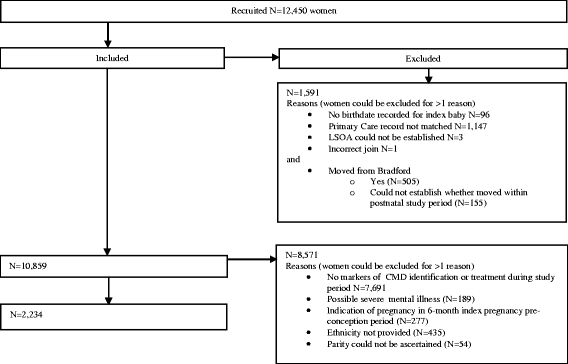Variation and ethnic inequalities in treatment of common mental disorders before, during and after pregnancy: combined analysis of routine and research data in the Born in Bradford cohort
- PMID: 27071711
- PMCID: PMC4830046
- DOI: 10.1186/s12888-016-0805-x
Variation and ethnic inequalities in treatment of common mental disorders before, during and after pregnancy: combined analysis of routine and research data in the Born in Bradford cohort
Abstract
Background: Common mental disorders (CMD) such as anxiety and depression during the maternal period can cause significant morbidity to the mother in addition to disrupting biological, attachment and parenting processes that affect child development. Pharmacological treatment is a first-line option for moderate to severe episodes. Many women prescribed pharmacological treatments cease them during pregnancy but it is unclear to what extent non-pharmacological options are offered as replacement. There are also concerns that treatments offered may not be proportionate to need in minority ethnic groups, but few data exist on treatment disparities in the maternal period. We examined these questions in a multi-ethnic cohort of women with CMD living in Bradford, England before, during and up to one year after pregnancy.
Methods: We searched the primary care records of women enrolled in the Born in Bradford cohort for diagnoses, symptoms, signs ('identification'), referrals for treatment, non-pharmacological and pharmacological treatment and monitoring ('treatment') related to CMD. Records were linked with maternity data to classify women identified with a CMD as treated prior to, and one year after, delivery. We examined rates and types of treatment during pregnancy, and analysed potential ethnic group differences using adjusted Poisson and multinomial logistic regression models.
Results: We analysed data on 2,234 women with indicators of CMD. Most women were discontinued from pharmacological treatment early in pregnancy, but this was accompanied by recorded access to non-drug treatments in only 15 % at the time of delivery. Fewer minority ethnic women accessed treatments compared to White British women despite minority ethnic women being 55-70 % more likely than White British women to have been identified with anxiety in their medical record.
Conclusions: Very few women who discontinued pharmacological treatment early in their pregnancy were offered other non-pharmacological treatments as replacement, and most appeared to complete their pregnancy untreated. Further investigation is warranted to replicate the finding that minority ethnic women are more likely to be identified as being anxious or having anxiety and understand what causes the variation in access to treatments.
Keywords: Anxiety; Depression; Ethnic group; Post-natal; Pregnancy; Treatment inequality.
Figures
Similar articles
-
Migration, ethnicity and mental health: evidence from mothers participating in the Millennium Cohort Study.Public Health. 2019 Jun;171:66-75. doi: 10.1016/j.puhe.2019.03.022. Epub 2019 May 16. Public Health. 2019. PMID: 31103615
-
Evaluation of ethnic disparities in detection of depression and anxiety in primary care during the maternal period: combined analysis of routine and cohort data.Br J Psychiatry. 2016 May;208(5):453-61. doi: 10.1192/bjp.bp.114.158832. Epub 2016 Jan 21. Br J Psychiatry. 2016. PMID: 26795424 Free PMC article.
-
Prevalence of common mental disorders and treatment receipt for people from ethnic minority backgrounds in England: repeated cross-sectional surveys of the general population in 2007 and 2014.Br J Psychiatry. 2022 Sep;221(3):520-527. doi: 10.1192/bjp.2021.179. Br J Psychiatry. 2022. PMID: 35049474 Free PMC article.
-
Ethnic differences in the initiation and duration of breast feeding--results from the born in Bradford Birth Cohort Study.Paediatr Perinat Epidemiol. 2013 Jul;27(4):388-92. doi: 10.1111/ppe.12052. Epub 2013 Apr 15. Paediatr Perinat Epidemiol. 2013. PMID: 23772941
-
Folic acid supplementation and malaria susceptibility and severity among people taking antifolate antimalarial drugs in endemic areas.Cochrane Database Syst Rev. 2022 Feb 1;2(2022):CD014217. doi: 10.1002/14651858.CD014217. Cochrane Database Syst Rev. 2022. PMID: 36321557 Free PMC article.
Cited by
-
Why do children under 5 years go to the GP in Lambeth: a cross-sectional study.BMJ Open. 2024 May 23;14(5):e082253. doi: 10.1136/bmjopen-2023-082253. BMJ Open. 2024. PMID: 38803264 Free PMC article.
-
Born in Bradford Age of Wonder cohort: A protocol for qualitative longitudinal research.Wellcome Open Res. 2023 Oct 10;7:270. doi: 10.12688/wellcomeopenres.18096.3. eCollection 2022. Wellcome Open Res. 2023. PMID: 37485293 Free PMC article.
-
Understanding ethnic inequalities in mental healthcare in the UK: A meta-ethnography.PLoS Med. 2022 Dec 13;19(12):e1004139. doi: 10.1371/journal.pmed.1004139. eCollection 2022 Dec. PLoS Med. 2022. PMID: 36512523 Free PMC article. Review.
-
Prenatal Depression and Symptom Severity by Maternal Race and Ethnicity.JAMA Netw Open. 2025 Mar 3;8(3):e250743. doi: 10.1001/jamanetworkopen.2025.0743. JAMA Netw Open. 2025. PMID: 40080023 Free PMC article.
-
Profiles of developmental disorder and associations with gestational age.Arch Dis Child. 2025 Jul 18;110(8):636-644. doi: 10.1136/archdischild-2024-327962. Arch Dis Child. 2025. PMID: 39929706 Free PMC article.
References
-
- Wittchen HU, Jacobi F, Rehm J, Gustavsson A, Svensson M, Jonsson B, Olesen J, Allgulander C, Alonso J, Faravelli C, et al. The size and burden of mental disorders and other disorders of the brain in Europe 2010. Eur Neuropsychopharmacol. 2011;21(9):655–79. - PubMed
-
- Gaynes BN, Gavin N, Meltzer-Brody S, Lohr KN, Swinson T, Gartlehner G, Brody S, Miller WC. Perinatal depression: prevalence, screening accuracy, and screening outcomes. In: Evidence Report/Technology Assessment No. 119. (Prepared by the RTI-University of North Carolina Evidence-based Practice Center under Contract No. 290-02-0016) AHRQ Publication No. 05-E006-2. Rockville: Agency for Healthcare Research and Quality; 2005. p. 1–225.
Publication types
MeSH terms
Grants and funding
LinkOut - more resources
Full Text Sources
Other Literature Sources
Medical



